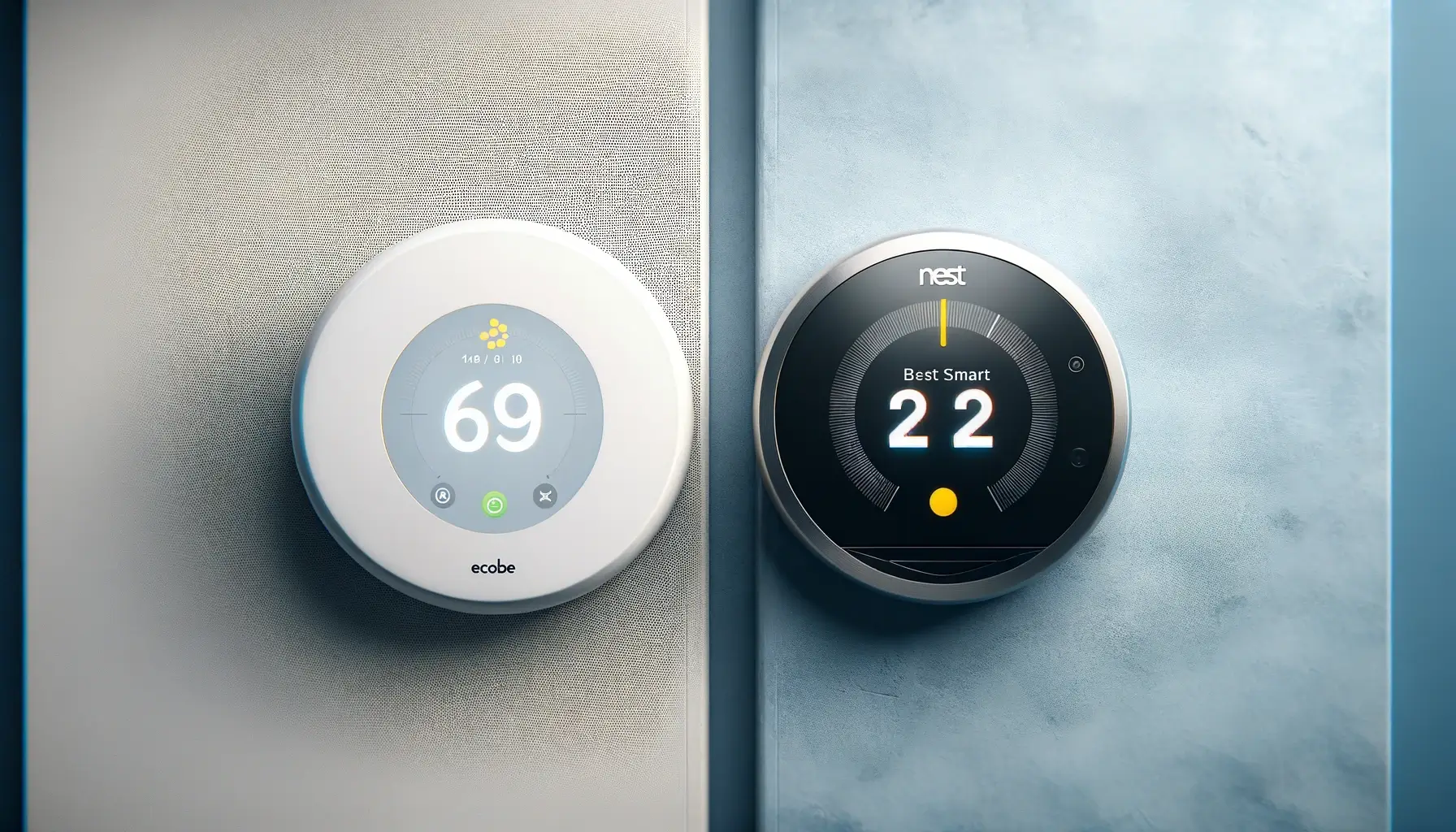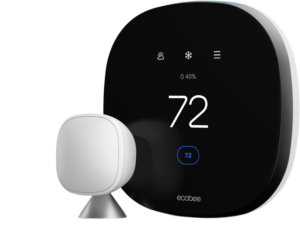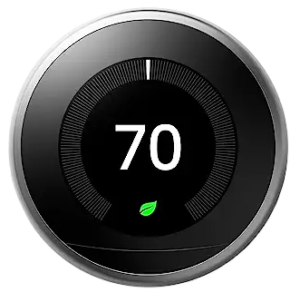As we step further into the era of smart homes, the importance of efficient energy management becomes paramount. Two industry leaders, ecobee and Nest, continue to innovate, offering cutting-edge solutions for intelligent home climate control. This comparison examines the 2024 iterations of these smart thermostats to determine which might be the superior choice for enhancing home efficiency.

Ecobee Smart Thermostat 2024:
Design and Build:
The 2024 Ecobee Smart Thermostat epitomizes modern home climate control with its sophisticated and sleek black metallic finish that exudes a contemporary charm. The device flaunts a large, vibrant LED touchscreen that stands out not only for its responsive touch interface but also for its clear and user-friendly interaction. The Ecobee’s design is a thoughtful blend of style and functionality, featuring a premium look that integrates smoothly into any home decor while offering an intuitive control system that caters to the needs of the user with simplicity and elegance.
Installation and Compatibility:
Ecobee’s 2024 smart thermostat model redefines the installation experience with user-centric design choices aimed at minimizing setup complexity. This model includes a Power Extender Kit, which is a boon for houses without a C-wire, expanding the compatibility to virtually any home. Such foresight ensures that users won’t need to modify their existing home infrastructure to accommodate this smart device. Furthermore, the Ecobee 2024 supports an array of smart home ecosystems, offering native integration with major platforms such as Alexa for voice control, Apple HomeKit for those in the Apple ecosystem, Google Assistant for seamless Google home integration, and Samsung SmartThings for wide-reaching smart device connectivity. This extensive support positions Ecobee as a versatile and adaptive choice for users looking to create a cohesive and efficient smart home environment.
User Experience:
- Geofencing and Radar: Utilizes advanced presence detection to manage home temperature.
- Eco+ System: Adapts thermostat settings based on local weather and energy rates.
- Occupancy Sensing: Adjusts temperature for occupied rooms, ensuring comfort where it counts.
- Energy Savings: Tailors heating and cooling patterns to save on energy bills.
Smart Features:
- Voice Control Integration: Built-in support for both Alexa and Siri, offering users the convenience of hands-free control over their home environment.
- Indoor Air Quality Monitor: A dedicated sensor to monitor and report on the air quality within your home, ensuring a healthy living space.
- SmartSensor: Enhances comfort and energy efficiency by adjusting the temperature based on occupancy and room usage.
Pros and Cons:
- Extensive Smart Home Compatibility: Works with a wide range of smart home ecosystems, including Alexa, Apple HomeKit, Google Assistant, and Samsung SmartThings, offering unparalleled integration flexibility.
- Advanced Sensors for Precise Control: Features like built-in radar and SmartSensor enable precise room-by-room temperature control and occupancy detection, ensuring comfort where and when it’s needed.
- Integrated Voice Assistants: With Alexa and Siri built-in, it offers hands-free control for adjustments and commands, enhancing the user experience without the need for additional devices.
Cons:
- Complexity for Some Users: The breadth of features and settings might be overwhelming for users seeking a simple plug-and-play solution.
- Limited Compatibility with Two-wire Heat-only Systems: This may not be suitable for older homes with basic heating systems, requiring additional adjustments or upgrades for full functionality.
Check out Ecobee Smart Thermostat 2024 .
Nest Learning Thermostat 2024:
Design and Build:
In contrast, the Nest Learning Thermostat 2024 retains its classic minimalist design ethos, delivering a user-friendly experience through its iconic dial interface that has become synonymous with the brand. The Nest is available in a variety of colors, allowing for personalization and ensuring that it can complement any room’s aesthetic. Its design is purposeful, with a focus on simplicity and ease of use, making the interaction with the thermostat not just functional but a part of the home’s overall ambiance.
Installation and Compatibility:
On the other side, the Nest Learning Thermostat 2024 continues to prioritize user convenience and seamless setup. It boasts an easy installation process that’s further facilitated by a compatibility checker, which simplifies the preliminary steps by ensuring the system you have at home is suitable for the Nest device before you proceed. For those who are already part of the Google smart home family, the Nest thermostat integrates effortlessly, syncing with the ecosystem to provide unified and intuitive control over your home’s climate. This integration is particularly advantageous for users who have invested in other Google smart home products, offering a streamlined, centralized management of their smart devices.
User Experience:
The Nest Learning Thermostat 2024 enhances your home’s climate control by learning and adapting to your temperature preferences. With time, it automates climate control, delivering both comfort and energy efficiency without the need for manual programming. The thermostat also includes features that promote energy savings, such as intelligent scheduling and detailed usage reports, which help you understand and manage your energy consumption better.
Smart Features:
- Voice Command Capabilities: Works flawlessly with Alexa and Google Assistant, allowing for easy temperature adjustments without lifting a finger.
- Learning Technology: Automatically learns and adapts to your temperature preferences, creating a personalized home climate control schedule.
- Lack of Apple HomeKit Support: While offering broad compatibility, the absence of Apple HomeKit integration could be a drawback for users deeply embedded in the Apple ecosystem.
Pros and Cons:
- Intuitive Learning Capabilities: Adapts to your temperature preferences over time, automating climate control for both comfort and efficiency.
- Stylish Design: Available in various colors, its minimalist design is both functional and aesthetically pleasing, fitting seamlessly into any home decor.
- Seamless Smart Home Integration: Specially optimized for Google’s ecosystem, it offers a cohesive experience for users with Google smart home products.
Cons:
- Premium Pricing: The advanced features and brand reputation come at a higher cost, which might be a consideration for budget-conscious consumers.
- Limited Compatibility Outside Google Ecosystem: The focus on Google integration may limit functionality or ease of use with non-Google smart home devices and services, particularly Apple HomeKit.
Discover Nest Learning Thermostat 2024 .
Comparative Analysis:
When evaluating the two smart thermostats for home efficiency, both Ecobee and Nest offer advanced features and smart integrations. Ecobee stands out with its broad compatibility with smart home systems and additional sensors for precise control. In contrast, Nest’s learning capabilities and integration with Google’s ecosystem make it an excellent choice for users already invested in Google smart home products.
The choice between Ecobee and Nest may come down to the specific needs and existing devices in your smart home setup. For those looking for an all-encompassing device with integrated voice assistance and advanced sensors, Ecobee is the preferable option. However, for users seeking a thermostat that learns and automates temperature settings over time, Nest remains a compelling choice.
Conclusion:
This comparative analysis provides a thorough breakdown of the features, design, user experience, and overall value of both the Ecobee and Nest smart thermostats for 2024, helping potential buyers make an informed decision.
FAQs:
Nest is discontinuing support for Nest Secure on April 8, 2024. While this does not indicate that Nest thermostats will stop working, it suggests a shift in support and services for certain Nest products.
The decision to replace Nest with ecobee depends on user preferences. If you prefer a ‘set it and forget it’ approach, Nest may be suitable with its learning capabilities. For those who enjoy delving into features and data, ecobee offers extensive customization.
The best thermostat depends on the user’s needs. The Google Nest Learning Thermostat is great for a simple setup and automated adjustments, but it lacks a remote sensor and doesn’t have built-in smart-speaker capabilities. Ecobee offers these features, which may be important for some users.
No, ecobee is not owned by Amazon. Ecobee is a Canadian home automation company acquired by Generac Holdings in 2021. They manufacture smart thermostats, sensors, and other home automation products.

